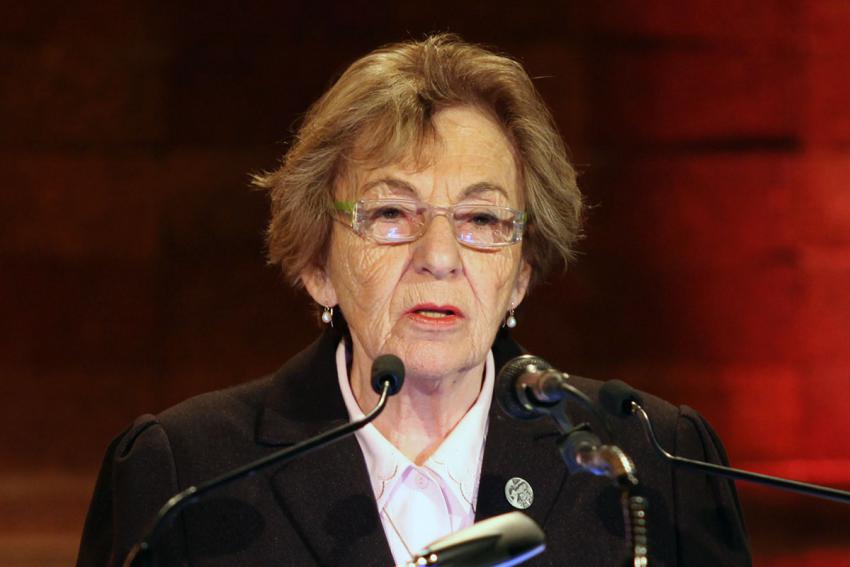This evening I am speaking in the name of all those who couldn't be here tonight: Those, who underwent all the suffering and whose cry was brutally cut off. Those who wrote, in the cattle cars, with their blood, "Seek revenge for our lives which have been lost." Those who were murdered in the forests of Treblinka, Ponary and Babi Yar, but the silence that enveloped them will cry out forever.

Aliza Shomron gives the address on behalf of the survivors at the opening ceremony of Holocaust Martyrs’ and Heroes’ Remembrance Day
I was one of the last to remain in the Warsaw Ghetto; a member of a Zionist youth movement. Heavy doubts and rumors of the liquidation of the ghetto spread through the ghetto. And despite that, we prepared for Passover. Rut Heiman, Mordechai Anielewicz 's courier and a commander in the Jewish Fighting Organization in the ghetto told me, "You have to leave the ghetto and go to the Polish side and try to survive. You are too young to fight… Go, tell how we fought and died here, in the ghetto."
Three times I was caught on the Aryan side; I escaped thanks to audacity, bribery and self confidence.
I acted as a courier between the two sections of the divided ghetto. In the winter nights, after the Great Deportation, I climbed onto the roofs and went from house to house with packets of posters from the Jewish Fighting Organization. The posters called for active resistance, "We will no longer allow our blood to be spilt for naught. We will not go according to the German's orders. We will escape and fight…" I had to stick the posters on the walls of the houses very carefully lest anyone see me and betray me.
My loyalty and solidarity to my movement overcame all fear and all my parents' prohibitions. I was only fourteen and a half.
When I used to go to the young people’s gathering place in Gęsia Street I was happy.
At night, hungry and weak, we would sing songs about Eretz Israel, in particular Hayalim Almonim (Unknown Soldiers) and Meshura Meshachrer Rak Hamavet (Only Death Releases From the Line of Duty).
Young men and women from all the pioneering youth movements – from every stream of the Jewish population, from extreme left to right, who had faith in a new life in Eretz Israel, ideals of honor and love of the Jewish people – fell as free individuals because they chose to fight against all the odds. Perhaps they also wanted to restore their people's downtrodden honor.
Were we naïve? Absolutely not. We believed that we had to take responsibility for the whole of the Jewish population.
As the spring of 1943 approached they paid more attention to us.
Everyone knew that the end was nigh and an air of battle was apparent in the ghetto.
The words of Mordechai Anielewicz, the adored leader, at the final gathering accompanied me wherever I went.
"Do not forget that the hardest thing in war is the battle within ourselves. Not to become accustomed to the degrading conditions that our enemies force upon us. One who becomes accustomed stops discriminating between good and evil, he becomes a slave both in body and soul to the degrading conditions. Whatever happens to you, remember: Don't accept, fight against this reality."
The uprising in the ghetto, in the forests and in the camps was an expression of a supreme strength that influenced the sense of pride felt by the generation that fought in the War of Independence. We, who survived by a miracle, didn't come to this land out of a sense of victimhood, but just the opposite. We brought with us the recognition that we didn't have anywhere else. Maybe that too is called strength. And also the will to live that hadn't deserted us, even in the death marches from Auschwitz and Majdanek.
From our loss a powerful life force shone forth and grew. We didn't complain, we closed in on ourselves and tried to forget the past. We didn't ask for pity, and it wasn’t given to us. Some years later, we started to talk, when society began to take genuine interest in us and to empathize with our suffering and not to fear us…
We took part in the struggle to establish the State of Israel and in Israel's wars, and our grandchildren continue in our path. We built kibbutzim and moshavim with the purity of Holocaust survivors. We enriched the culture and science, we made a living from our own hands and we are proud of our State.
I have been given the responsibility to talk about the fighters. I will not rest until more youth have joined to take the burden of memory from me and to take it forwards to future generations. Remember our people, who were murdered, remember the fighters, and safeguard the dignity of mankind.
